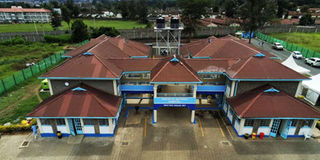Anxiety before mass testing in isolation camp

The Kenyatta National Hospital's Infectious Disease Unit at Mbagathi, Nairobi, where Covid-19 patients are being treated in this picture taken on April 17, 2020. PHOTO | JEFF ANGOTE | NATION MEDIA GROUP
What you need to know:
When we finally met for the prayers, I realised that the pastor had not come.
Instead, we met a grey-haired, slim man in his late 50s. He had arrived from Malawi.
I realised that there were many people from Malawi at this camp. I didn’t know why but wondered silently.
You need massive strength to survive quarantine. But one question I kept asking as I lay hopelessly in this poorly ventilated room was, “Just who ate that bat in China?” I was here paying for somebody’s mistake. My sleep pattern had been disrupted.
On the third day in quarantine, and as I was leaving my room, I came across this young woman. She had a rosary, perhaps her only source of inspiration in the circumstances. We began talking, and she told me she had interacted with a pastor the previous day, and that they had agreed to plan for prayer meetings that evening. Was I interested? She asked. I nodded, yes.
I had done Bible studies before, but for different purposes. This time I wanted to keep my spirit up. I was practically in a “detention camp”.
When we finally met for the prayers, I realised that the pastor had not come. Instead, we met a grey-haired, slim man in his late 50s. He had arrived from Malawi. I realised that there were many people from Malawi at this camp. I didn’t know why but wondered silently.
The meetings went on for a few days, but we never did any Bible study. We just opened up on our fears and it became an hour for venting. We would narrate our fears regarding our predicament.
The man, whom we nicknamed Kofi Annan, had a school in Kajiado County. One of my friends had some construction work in Thogoto that had been interrupted by the crisis. Venting helped. We became less moody and more even tempered although unsure of what lay ahead.
Every morning, after breakfast, we looked forward to our scheduled meetings. This helped for a while. Beatrice, a woman from Karen, confessed that she had never read the Bible. And this despite having grown up in Thogoto, a stronghold of Christianity in Kenya. We all laughed at that, although there were few jokes. Light moments would follow, and we felt like a new holy family. But was it?
Something else happened. I lost track of time and could not tell what day or time of the week it was. There was no TV, no newspaper, no radio. Social media was our only connection with the healthy world. We, the risk sapiens, had to rely entirely on hearsay… and daily updates from the ministry of Health via Twitter or Facebook.
I counted down the days and slowly gathered hope and sanity, knowing it was a temporary situation. One day, I looked at my suitcases in my small room, my new home. I realised I was still on safari. Most of the people here had shopped for their families, only that the welcoming ululations and party had not happened. Instead, security and health workers had shoved them around like common criminals into National Youth Service buses. The gifts remained intact, one week after arrival. Those were the ironies of life.
I realised that anything can happen to you in a split second. Things can change due to a single event that one had nothing to do with.
After a few days, and to our dismay and concern, we noticed some new faces. People who had been added to our camp days after flights had been stopped. We also had some Pakistani nationals and wondered how they had landed in Kenya after the directive that only Kenyans would be allowed in.
Since there was one table where we all queued for meals and temperature checks, it was easy to notice new faces. This brought some unease and raised questions. But no one gave us no explanation.
Then came the day for Covid-19 testing at the camp. Those in quarantine had made light of the idea that the Ministry of Health did not have enough testing kits to waste on us and, had, as a result, gone on with life as usual, visiting one another in their rooms and even playing cards!
Since we all had our temperature taken religiously at noon daily, most assumed that would remain the ultimate test. Shock on them when, on the eighth day, medics in white protective gear arrived. The scamp went silent. Everyone seemed uncomfortable, recollecting whether they had been careful enough, whether they had experienced any sore throat, however mild; and whether any of their close contacts had coughed or sneezed in their presence in the past week.
It was time for the mandatoryCovid-19 test. And unlike during temperature checks and meal times, no one wanted to go first. There was no counselling on what to expect. We had no idea what it entailed, which I found unprofessional and unethical. Why didn’t the doctors explain such a sensitive procedure to “suspects”, as they called us?
We got into a line. The first person held the medics’ hands in pain and discomfort. One by one, we all went through the uncomfortable procedure. That afternoon, the mood at the camp changed drastically. There was reflection, prayer and hope. No one left their room. Although dinner was served at 5pm, as usual, no one seemed keen on chitchat.
That evening, only YouTube gospel music could be heard from the cell phones. Mine was, perhaps, the loudest. Music of hope. Encouragement. Pleading with God for “good” results. But there was nothing I could do. The sample had been taken.
Tomorrow: The nightmare of waiting for Covid-19 results.




